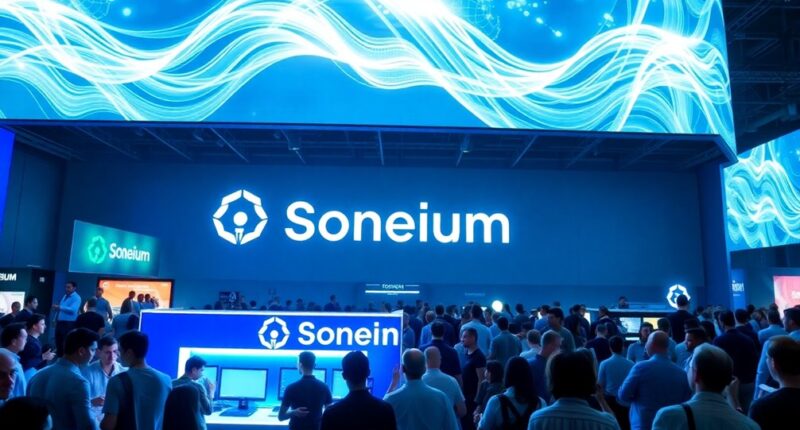Sony's Layer-2 blockchain, Soneium, has officially launched, connecting everyday internet services with decentralized applications. With a focus on scalability and efficiency, it addresses slow processing and high fees while featuring advanced security measures like multi-signature wallets and smart contract audits. Soneium also emphasizes sustainability, aligning with Sony's responsible practices. The platform has secured regulatory approval, ensuring user confidence with built-in compliance checks and KYC features. As the blockchain landscape evolves, you may want to explore how Soneium influences the growing trends and opportunities in the crypto space.
Key Takeaways
- Soneium is Sony's newly launched public blockchain designed to connect everyday internet services with decentralized applications.
- The platform features a scalable design to improve processing speed and reduce transaction fees.
- Soneium prioritizes sustainability, aligning its operations with Sony's responsible business practices.
- It includes automated compliance features, ensuring adherence to local and international regulations.
- Soneium supports advanced security measures, such as multi-signature wallets and smart contract audits, enhancing user confidence.
Soneium's Launch Announcement

Soneium has officially launched, marking a significant milestone in making blockchain technology more accessible to everyone. This public blockchain connects everyday internet services with decentralized applications, targeting a broader audience.
You'll appreciate its scalable and efficient design, which tackles common issues like slow processing speeds and high fees. Soneium empowers developers with a user-friendly environment, fostering cross-industry collaboration and driving digital transformation. Additionally, it emphasizes sustainability, aligning with Sony's commitment to responsible practices. The platform also supports multi-signature wallets, smart contract audits, and advanced encryption techniques to ensure security and compliance.
With its multi-layered security approach, Soneium is designed to protect sensitive data while enhancing user trust. With the production environment now open, you can engage with real crypto assets and explore the innovative opportunities Soneium offers.
Regulatory Approval Secured

With regulatory approval now secured, users can confidently engage with Soneium's innovative platform, knowing it adheres to legal standards. The platform incorporates automated compliance checks, ensuring applications meet both local and international requirements. You'll benefit from robust reporting features that generate detailed compliance reports tailored to various jurisdictions. Soneium also integrates with third-party compliance services, enhancing adherence to regulations. With built-in KYC and AML features, it actively prevents illicit activities. Designed with GDPR compliance in mind, Soneium emphasizes data protection. By adhering to token compliance standards and supporting cross-industry regulations, the platform navigates the complex regulatory landscape effectively, simplifying compliance processes and reducing administrative burdens for developers. This makes Soneium a trustworthy choice for blockchain engagement. Additionally, Soneium's features align with its aim to create a comprehensive ecosystem, fostering collaboration among developers and enterprises.
Crypto Investment Patterns

As the regulatory landscape for cryptocurrencies stabilizes, a noticeable shift in crypto investment patterns is emerging.
You'll see increased institutional adoption, especially with the SEC approving Bitcoin and Ethereum hybrid funds. This regulatory clarity is encouraging more retail participation as major economies provide supportive policies. The launch of spot Bitcoin ETFs has notably attracted significant institutional investment, enhancing the overall market dynamics. Additionally, investors are starting to explore risk management strategies to better navigate the volatile crypto landscape.
Blackrock's recommendation to allocate 2% of investment portfolios to crypto signals strong confidence in its future.
Additionally, the filing of Ripple and Solana ETFs indicates a trend toward diversified investment products, making crypto more accessible to you.
Altcoin rallies are also gaining traction, inviting diversification into your portfolios.
With AI tokens on the rise, you might find new opportunities for growth as these assets gain popularity in the market.
Corporate Blockchain Integration Trends

While many companies navigate the complexities of digital transformation, integrating blockchain technology is becoming a strategic priority. You'll notice that enterprises are increasingly adopting blockchain for its decentralized security, which enhances protection from cyber threats. The demand for skilled blockchain experts is on the rise, prompting companies to offer competitive incentives. AI-enhanced verification is improving reliability, while regulatory frameworks are evolving to support this trend. Additionally, blockchain fosters cross-sector collaboration, paving the way for secure data exchange. Furthermore, AI technologies are improving threat detection in cybersecurity, which is crucial for businesses adopting blockchain. However, challenges remain, like the need for user-friendly interfaces and overcoming scalability issues. Despite these hurdles, tokenization and DeFi integration are revolutionizing operations, showing that the future of corporate blockchain looks promising and transformative. Furthermore, the global market for blockchain services is projected to grow from $3.28 billion in 2022 to $19.76 billion by 2027.
Government Regulations Impacting Blockchain

Integrating blockchain technology has prompted not just corporate shifts but also a need for robust government regulations.
You'll notice that the lack of comprehensive authority creates gaps in regulating crypto assets not classified as securities. The Digital Asset Working Group was formed to improve coordination among regulators, yet timely responses to risks remain a challenge.
States like Florida have initiated financial technology sandboxes, allowing firms to test innovations. However, complexities arise with multiple regulators having overlapping jurisdiction, complicating compliance. The existing stablecoin market valued at nearly $130 billion underscores the urgency for regulatory clarity.
Focus areas include fraud prevention, consumer protection, and tax implications, as the IRS treats cryptocurrency as property.
As the landscape evolves, it's crucial for you to stay informed about these shifting regulatory dynamics.
Market Adoption Projections

Given the rapid evolution of blockchain technology, market adoption projections reveal both exciting opportunities and significant challenges ahead.
With over 15 million active wallets and nearly 50 million transactions processed during the testnet phase, there's a strong foundation for growth. However, sustaining this momentum hinges on delivering a user-friendly experience and attracting developers to create innovative applications. Competing in a crowded market dominated by established solutions, Soneium can leverage its unique access to Sony's entertainment services to enhance engagement. Yet, security concerns, regulatory scrutiny, and the need for seamless integrations remain pressing issues.
Frequently Asked Questions
What Are the Main Features of Soneium?
Soneium boasts several key features that enhance your blockchain experience.
It's fully EVM-compatible, enabling you to deploy Ethereum-based smart contracts efficiently.
With its Layer-2 solution, you'll enjoy reduced transaction costs and improved scalability for high-throughput applications.
The integration of Optimism's OP Stack and Superchain technologies ensures speed and security.
Plus, you'll benefit from developer-friendly tools and resources, making it easier to create and manage decentralized applications tailored to your needs.
How Does Soneium Differ From Other Layer-2 Blockchains?
Soneium stands out from other Layer-2 blockchains due to its exceptional scalability and speed.
You'll notice it processes millions of transactions per second, far surpassing typical Layer-1 capabilities. Its EVM compatibility allows easy deployment of Ethereum-based dApps, while reduced transaction costs make it ideal for microtransactions.
Additionally, Soneium inherits robust security features from the main chain, ensuring your transactions remain secure without sacrificing performance or user experience.
What Is the Expected Transaction Speed of Soneium?
You might think layer-2 solutions are all the same, but Soneium stands out with its impressive transaction speeds.
Thanks to Optimistic Rollups and Plasma Chains, it can handle thousands of transactions per second, significantly reducing confirmation times.
Plus, with sharding, Soneium ensures efficient scaling as the network grows.
This combination not only boosts throughput but also maintains security, making it a compelling option for developers seeking fast and reliable blockchain solutions.
Will Soneium Support Smart Contracts?
Yes, Soneium will support smart contracts.
You'll find it built on the Ethereum network, ensuring compatibility with EVM, which enhances its smart contract capabilities.
With a developer-friendly environment, comprehensive tools, and rigorous security audits, you can confidently deploy your smart contracts.
The platform also incorporates KYC and AML compliance features, making it safe and reliable for all users, streamlining the entire development process for you and your projects.
How Can Developers Integrate With Soneium?
Imagine stepping into a digital playground where your ideas come to life.
To integrate with Soneium, start by using Web3Auth for seamless access to blockchain calls. Deploy smart contracts with Hardhat, then craft a Next.js frontend for user interaction.
Don't forget the zkEVM for scaling and efficiency!
With comprehensive documentation as your map, you'll navigate this innovative landscape effortlessly, turning your visions into reality in no time.
Conclusion
With Soneium now live, you’re witnessing a game changer in the blockchain landscape. This launch not only highlights Sony’s commitment to innovation but also emphasizes the growing acceptance of crypto in corporate structures. As regulations tighten, staying ahead of the curve is key. So, don’t miss the boat—embrace the changes and explore the potential this new layer-2 blockchain offers. The future’s looking bright for those ready to dive in! As businesses increasingly integrate blockchain technology, discussions around its implications are becoming more prominent, including the recent vitalik buterin and sony controversy. This dialogue has sparked interest and debate among industry experts and enthusiasts alike, raising questions about the ethical considerations and potential partnerships in this evolving space. By addressing these challenges head-on, organizations like Sony can not only solidify their position in the blockchain arena but also pave the way for innovative applications that can reshape their operational frameworks.









